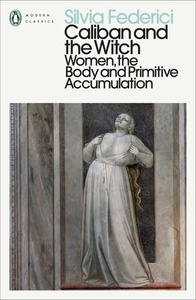Take a photo of a barcode or cover
Unbelievably good, fascinating. Provocative history / analysis of the role of the witch-hunts in the transition from feudalism to capitalism. This is just a wondrous piece of work. Federici keeps things just humming along and her prose is clear, tight, engaging.
Best of all, it's one of those books that clicks quite a few things into place. This world, this messed-up and troubling world, well it's still messed-up but you can see a bit more of the path that brought us to this place. And, surely, that kind of a re-orientation can at least offer a little hope for change from here.
Maybe?
Best of all, it's one of those books that clicks quite a few things into place. This world, this messed-up and troubling world, well it's still messed-up but you can see a bit more of the path that brought us to this place. And, surely, that kind of a re-orientation can at least offer a little hope for change from here.
Maybe?
informative
reflective
slow-paced
inspiring
reflective
sad
slow-paced
An amazing book and a must-read for anyone seriously thinking about feminism and capitalism
challenging
dark
informative
reflective
sad
slow-paced
I appreciate how expansive and how thorough the author covered this topic with examples and images. Dark, dense and heavy with end notes, so it's not an easy read but it was incredibly rewarding. I really appreciate how she has covered troubles faced by the lower-classes and made clear connections internationally and between different time periods. I learned a lot and now have a whole slough of her sources I'm looking forward to reading as well.
This is an eye-opening book, highly recommended! It ought to be on anyones reading list, but more specifically for those interested in early modern, capitalist or feminist history!
informative
slow-paced
My notes: https://anaulin.org/blog/book-notes-caliban-and-the-witch/
Key learnings:
- Marxism forgot about the witch-hunt - a major shortcoming as we continue to figure out how to understand and dismantle the ongoing impacts of global capitalism and processes of primitive accumulation.
- People's (in)ability to leave their homelands - or stay on their own terms - has for a long, long time now been about labour and resource extraction.
- Women were highly respected health practitioners before the "transition to capitalism."
- Magic, spirituality, sexuality, and the commons, as they existed conceptually in Europe before capitalism, were all deeply threatening to the of the capitalist system. God and the Devil were/are highly effective mechanisms for naturalizing the destruction of these concepts as they had once existed - both in Europe and in colonized lands.
- Bodies also had to be understood differently in order for them to be justifiably subordinated to capitalism; understanding our bodies as machine-like is helpful in compelling us to participate as workers under capitalism.
"This is how we must read the attack against witchcraft and against that magical view of the world which, despite the efforts of the Church, had continued to prevail on a popular level through the Middle Ages. At the basis of magic was an animistic conception of nature that did not admit to any separation between matter and spirit, and thus imagined the cosmos as a living organism, populated by occult forces, where every element was in 'sympathetic' relation with the rest. In this perspective, where nature was viewed as a universe of signs and signatures, marking invisible affinities that had to be deciphered...every element - herbs, plants, metals, and most of all the human body - hid virtues and powers peculiar to it..." (p. 141-42).
- Marxism forgot about the witch-hunt - a major shortcoming as we continue to figure out how to understand and dismantle the ongoing impacts of global capitalism and processes of primitive accumulation.
- People's (in)ability to leave their homelands - or stay on their own terms - has for a long, long time now been about labour and resource extraction.
- Women were highly respected health practitioners before the "transition to capitalism."
- Magic, spirituality, sexuality, and the commons, as they existed conceptually in Europe before capitalism, were all deeply threatening to the of the capitalist system. God and the Devil were/are highly effective mechanisms for naturalizing the destruction of these concepts as they had once existed - both in Europe and in colonized lands.
- Bodies also had to be understood differently in order for them to be justifiably subordinated to capitalism; understanding our bodies as machine-like is helpful in compelling us to participate as workers under capitalism.
"This is how we must read the attack against witchcraft and against that magical view of the world which, despite the efforts of the Church, had continued to prevail on a popular level through the Middle Ages. At the basis of magic was an animistic conception of nature that did not admit to any separation between matter and spirit, and thus imagined the cosmos as a living organism, populated by occult forces, where every element was in 'sympathetic' relation with the rest. In this perspective, where nature was viewed as a universe of signs and signatures, marking invisible affinities that had to be deciphered...every element - herbs, plants, metals, and most of all the human body - hid virtues and powers peculiar to it..." (p. 141-42).
challenging
informative
slow-paced
challenging
informative
reflective
slow-paced




